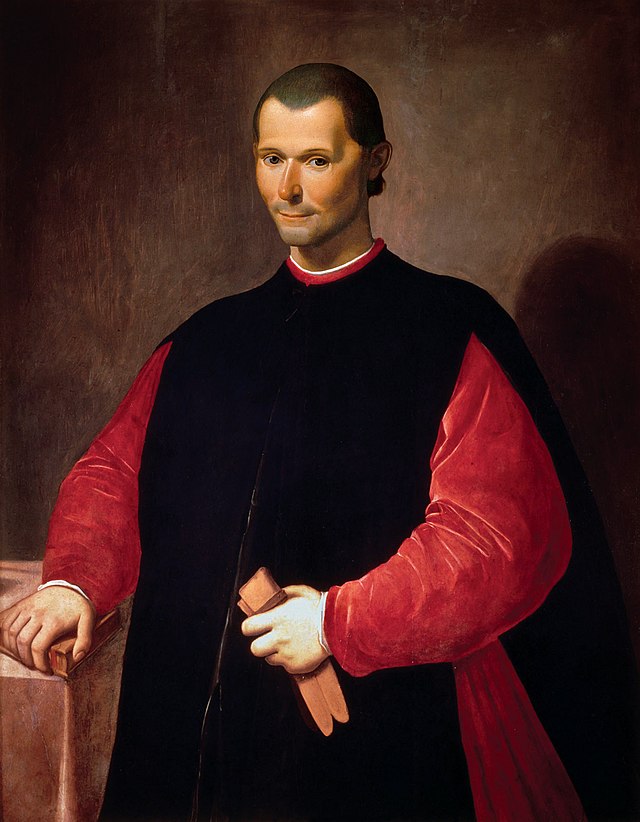A Summary of The Prince by Niccolò Machiavelli Part 1

Introduction
Niccolò Machiavelli’s The Prince is one of the most influential political philosophy books of all time. It is even credited with starting modern political thought. Niccolò Machiavelli's work has been considered evil and anti-Christian, as well as, brilliant and a necessary work of political art. It was created in the early 16th century and officially published in the 1530's. Its writings were different from other works at the time. For it gave rules for the prince to follow, but was more concerned with practical rules, rather than supposed virtuous rules. I am going to divide this summary up into 5 different parts. This is in order to not overwhelm anyone. I will release a full summary for those that just want to read the whole thing at once. For now, this post will cover chapters 1 through 6.
Chapter I: How Many Kinds of Principalities There Are, and By What Means They Are Acquired
“All states and governments that ever ruled over men have been either republics or monarchies.”
Chapter one is an extremely short chapter. It simply gives a list of categories and subcategories for states. Up front, states are either republics, or principalities (though Machiavelli does not explicitly define these terms). Furthermore, principalities are either hereditary or new. Hereditary principalities are, obviously, a state that is passed down, usually, within a royal family. New states can be further divided into either completely new or appendages of already established states. Each of these are further examined in later chapters of The Prince.
Chapter II: Concerning Hereditary Principalities
“So I’ll begin by noting that hereditary monarchies where people have long been used to the ruler’s family are far easier to hold than new ones; all a monarch need do is avoid upsetting the order established by his predecessors, trim policies to circumstances when there is trouble, and, assuming he is of average ability, he will keep his kingdom for life.”
The first line in chapter two tells the reader that republics will not be further examined, as he had looked into republics in other works. This chapter is mostly focused on hereditary principalities, as the name of the chapter implies. According to Machiavelli a hereditary principality is easy to hold onto. This is because the population is, more or less, used to the royal family by the time of the new prince. Even if the state is conquered by another prince, any slip up will make the population clammer for the original royal family and, therefore, the old prince. However, Machiavelli points out that this ease can be undone through an improper vice.Chapter III: Concerning Mixed Principalities
“When a monarchy is new, things are harder.”
Chapter three focuses on new principalities. Machiavelli argues that new principalities are more difficult to hold onto than hereditary principalities. Part of the reason for this is because people will trade out a new ruler to get a newer ruler who may become more advantageous to the people. In other words, new principalities have the unfortunate characteristic of quick ruler turnover with no ruling family. This fact can always lead to revolt and disorder. The people that put the new prince into power will never be able to live up to the desired improvement. However, if the prince is able to quash any revolt, he can prevent further revolt by harshly punishing the perpetrators and general opposition. The revolt will give the prince the ability or excuse to treat his subjects more harshly than they would have previously without the revolt.Machiavelli continues to discuss new principalities and how to hold onto them. He argues that it is easier to hold onto the new principalities if they speak the same language and have similar customs as the new prince. The only thing necessary for the prince to really have to do in order to gain control is kill the previous ruling family and maintain the laws and taxes. Machiavelli says that people will live peacefully and quietly, as long as their way of life remains, more or less, consistent. This begs to reason, that a new principality that doesn’t speak the same language or hold similar customs is more difficult to hold. The best way to overcome this difficulty is to move to the new state, to live amongst the newly acquired people. Those that mean good will be more likely to show their allegiance, while those with evil intent will be more likely to fear the prince. Machiavelli argues that people are either meant to be pampered or crushed and actions should mirror this fact.
Chapter three continues to look into the best way to hold onto new principalities. One of the factors, that needs to be made to pay attention to, is the need to dominate neighboring countries. Essentially, Machiavelli argues that the prince should weaken strong neighbors. The prince should also ensure no stronger states invades a neighboring state. Weaker states are not so much a concern because they will naturally ally with stronger state. That is, as long as they don’t see themselves having the ability to grow stronger than the stronger state.
Machiavelli ends chapter 3 by stating what he sees as important things for the prince to recognize. First, people want to acquire more. When they are successful, they are praised. However, if they try without having the ability or try at the cost of their own state, they should be condemned. Also, a successful prince understands both warcraft and statecraft. The two are intertwined. War can never be avoided, only postponed to the advantage of their enemies.
Chapter IV: Why the Kingdom of Darius, Conquered by Alexander, Did Not Rebel Against the Successors of Alexander at His Death
“You would have thought the whole area would have rebelled, yet Alexander’s successors held on to it and the only trouble they had arose from their own personal ambitions and infighting.”
Next, let’s take a look at chapter four. Machiavelli starts out by explaining that there are two ways to govern a principality. Either governing with ministers or with nobles. A minister is preferable because they are still subservient to the prince. Nobles, however, are not appointed, but instead have an ancient linage and have subjects of their own. It is also harder to take over a country whose government utilizes ministers instead of nobles. There are always nobles who desire change, and have command over subjects who could be used to overthrow the prince. This also means it is harder to control a government that has nobles. Much for the same reason, because a noble always has their own desires and ability to cause discontent. However, with ministers all that is needed is to kill the previous royal family.Chapter V: Concerning the Way to Govern Cities or Principalities Which Lived Under Their Own Laws Before They Were Annexed
“When the states you invade have been accustomed to governing themselves without a monarch and living in freedom under their own laws, then there are three ways of holding on to them: the first is to reduce them to rubble; the second is to go and live there yourself; the third is to let them go on living under their own laws, make them pay you a tax and install a government of just a few local people to keep the state as a whole friendly.”
Chapter five, as one would think, comes after chapter four. This chapter is about states who had lived under their own laws before the prince. Machiavelli claims there are three ways to hold onto a state. These include: devastating them, conquering them, and to allow them to keep their own laws, but tax them and install an oligarchy to control the state. Surprisingly, Machiavelli suggests the third option to be the most advantageous. An oligarchy is advantageous because they owe its very existence to the prince and can’t survive without said prince. As long as destruction isn’t the goal, it behooves the prince to use the newly obtained state’s own citizens to control the population.That all being said, complete destruction is the best way to secure a state that was free in the past. Rebellions will always have a chance of happening in order to bring back old traditions. This may even be in spite of the country having benefited. The benefits can be outweighed by the fact that the traditions can unite the population against the prince. Revenge and feelings of hatred against the prince, in republics, will remain strong with memories of old traditions. The memories of a free republic and liberty will never die. This results in the fact that it is easiest to destroy a republic or at the very least personally occupy said republic.
Chapter VI: Concerning New Principalities Which Are Acquired by One’s Own Arms and Ability
“So, if you’re sensible, you set out to follow a trail blazed by someone who was truly great, someone really worth imitating, so that even if you’re not on the same level yourself at least you’ll reflect a little of his brilliance.”
In chapter six, Machiavelli suggests that it is important for a prince to set lofty goals. It matters not whether those goals are achieved. His actions in trying to achieve such goals will probably enhance his reputation as a great or powerful leader. This chapter focuses on the fact that rulers may acquire states through their own abilities. This is in contrast to those that gain a state through a noble birth, inheritance, or even lucky circumstances. Obviously, in comparison to the other ways of acquiring a state, achieving such a feat through their own abilities is difficult. However, it will prove, in the long run, easier to maintain control.Success is more assured for those that have put forth blood, sweat, and tears into gaining their new state. They are better prepared to meet the challenges in creating a new order within a state. For you see, Machiavelli recognizes that there is nothing more dangerous or difficult for a prince than creating a new order. Those who are most likely to benefit from a new order will only give a lukewarm support. A prince that is reliant on his skills to persuade others will see that they are unable to succeed against such opposition. However, the prince who relies on his own prowess and is able to force the issue of support will be in a better position to succeed. This might have to come with using force in order to gain such support. This always has the possibility of backfiring, but if it is successful then the prince may become stronger, more secure and well respected.
Conclusion
I realize that The Prince by Machiavelli can be a dense book to understand. This summary can also come across as long, to some. It is for this reason; I will be splitting my summary of each chapter of the prince into multiple parts. I suggest if this reading is difficult or complicated, to walk away before proceeding to the next part. I only covered 6 out of the 26 chapters in this first part. I invite you to continue on, and see what else Machiavelli has to say concerning the prince and how they may survive and flourish in the world of politics. If, however, you want to read the whole summary, I will be providing that as well.
